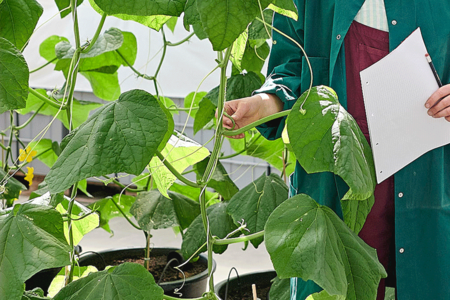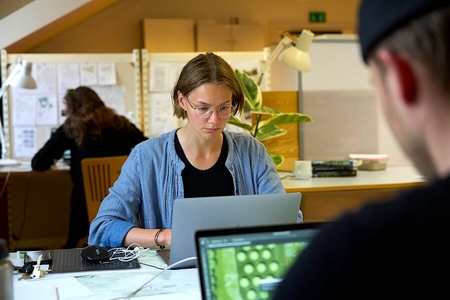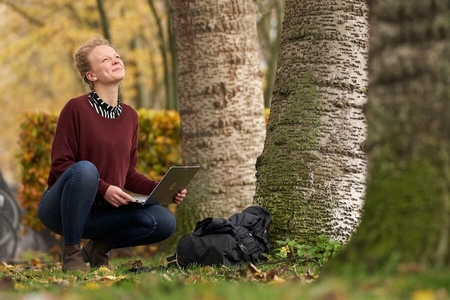Astrid Harbo holds an MSc in Forest and Nature Management. A desire to work with development and sustainability in developing countries took her to South Sudan, where she currently works for the UN World Food Programme.
“I’m employed by the UN as a Junior Professional Officer (JPO) under the UN World Food Programme in South Sudan. We distribute food to the most vulnerable people in war and disaster areas.
Normally, this kind of help is given unconditionally, but I have been assigned to one of the more development-oriented food programmes. This means that we provide food, while the locals work to create assets, i.e. build roads and dykes, cultivate land, establish vegetable gardens etc. We hope that they will thereby be able to create their own future and become more resilient, particularly to war or climate change.
My role is to coordinate and report on our activities in seven of the ten South Sudan states we are active in. I’m responsible for liaising with our donors.
I also engage in dialogue with our partners when we launch new projects, and I monitor their activities to ensure that they meet our standards. For example, the locals have to construct a certain length of road in order to get help from us. I am involved in assessing whether these requirements are being met, and whether the locals are informed about how much food they are entitled to, and which technical and environmental standards the various roads and farms must comply with.
Pathway To The Job
Every year, the Danish Ministry of Foreign Affairs advertises a number of Junior Professional Officer positions with the UN. These target young people under 32 who are graduates and have some work experience, preferably from developing countries. I applied and was fortunate enough to get the job in the first round.
One of the reasons I got the job was my technical background from Forest and Nature Management in relation to nature management principles and factors that influence plant growth etc. The programme also provided me with the necessary organisational and strategic overview.
Another important factor was that I have travelled and worked in various countries. The first thing I did on my master’s programme was a six-month exchange in Australia. They have a strong focus down under on handling conflicts between local communities and external stakeholders who want to exploit natural resources.
I continued working with conflict management when I returned home, and ended up going to Tanzania, where I wrote my master’s thesis on conflicts between farmers and elephants. After graduating, I also went to Ghana on an internship with an international NGO.
A Typical Day Working For The UN
I work a lot in the office in the capital Juba, but I also venture into the field to monitor that our activities are running as they should.
A typical day at the office might involve meeting with our partners to discuss how to implement our activities, and what challenges they are facing. I might also hold meetings with our donors, to discuss certain goals we need to meet.
Astrid Harbo at work in Southern Sudan
For example, we have announced the goal of involving more women in our activities. Women are very marginalised in South Sudan, and we want to involve them more in the decision-making processes.
Out in the field, I evaluate how the local farmers cultivate the soil. For example, it has been a traditional practice to burn large tracts of woodland in order to cultivate a small plot of land. In such cases, I use my technical knowledge of agriculture and cultivation methods to propose alternative, more sustainable solutions.
Challenges In My Work
There is still armed conflict in South Sudan, and this affects my work here. I’m not a target as such – but some of our local employees have to be careful which areas they operate in.
As a result of the political tensions in South Sudan, my colleagues and I live and work in a guarded compound that we never leave after 21:00. You also quickly learn not to discuss politics and tribal relationships. Because conditions are a little more difficult here than in other areas where the UN operates, my work is organised in such a way that I have to go home or to another country every six weeks to have a break.
When working in the field, I can’t speak to the locals, because they often only speak their own language. All communication is via our local employees, who come along and act as interpreters. I feel this is a challenge, because I would really like to understand the details of what the locals are saying. Some of the meaning is lost in translation.
My Passions
Working with a lot of other nationalities is very rewarding. It’s also really exciting to work in a political context that I’m forced to take into account as I go about my daily work. I constantly need to factor in issues like inflation, the conflict and the country’s attempt to establish a viable government.
I’m absolutely passionate about driving development together with the local population and about utilising the area’s natural resources in a sustainable way that benefits those who live there and reduces the environmental impact.
In the long term, I would like to work more in the field, solving the practical problems associated with utilising natural resources in disadvantaged areas. For example in Haiti, where severe deforestation has caused problems for people and the environment.
I don’t mind getting my hands dirty, in fact I’d like to, working with locals to ensure the best possible utilisation of the forests. To create a culture where people think about sustainability instead of felling trees indiscriminately, because this course can lead to major problems with erosion, waste accumulation and collapsing houses.
Away From The Classroom
I didn’t start studying Forest and Nature Management with a particular goal in mind. I took things one step at a time. It’s a good idea for some people to plan their career path, but I was driven by what I found academically stimulating, and where that interest could take me.
I know that students are under immense pressure today to complete their studies within the prescribed time, but I would still encourage others to take some chances and try out other study-related activities, e.g. by going on an exchange. This brings a lot more personal and professional growth than simply sitting in a classroom.”





